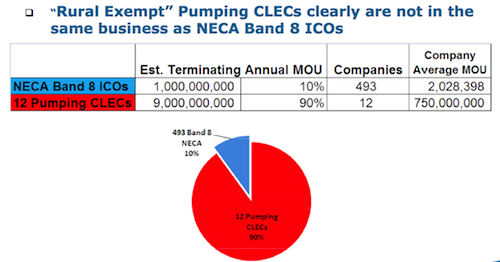Not according to, er, AT&T. “Intellectual contradiction” and “noisome trumpeter” and other mean words were lobbed at Google by AT&T in a letter to the FCC in September 2009. You get a little dizzy reading this contrivance especially when AT&T is holding this search provider’s feet to the fire by quoting an FCC policy statement on Internet competition: “consumers are entitled to competition among network providers, application and service.”
Wow, so does that mean AT&T is suggesting that the FCC should be regulating Internet applications to promote competition?
This would all be another day-in-the-life of squabbling service providers—read below the he-says-she-says between AT&T and T-Mobile over competitive pricing for TDM-based backhaul — but this is Google, and Google Voice is now open to the public.
Formerly “invitation only,” Google Voice’s very nice free personal attendant-UC service has a drawback: they will block calls to certain areas— mostly rural—because the CLEC’s doing the termination there are charging high access fees—too much for this free service to digest.
So does Google Voice, under current statutes, constitute common carriage as AT&T claims and is therefore violating its universal service obligations?
Well, no. The Communications Act’s definition is famously circular and states that a common carrier is “any person engaged as a common carrier for hire.”
The key point that Google makes in its Google Public Policy blog on this matter is that its service is free (as in not “for hire”) and therefore not subject of common carrier rules. Touche.
Another important talking point is that Google Voice is not holding itself out to the public as a communications provider: you do need a landline phone or cell phone to use it.
That would pretty much settle the matter for me and most others. However, the FCC is interested in learning more about this service and has sent a letter to Google with a list of questions (which Google can answer privately.)
One of the burdens of being a common carrier is the requirement to interconnect. Internet ISPs do not have that obligation: back-bone carriers, ISPs, ASPs,etc. are not required by law to link to each other. However, incumbents and CLECs must provide interconnection to each other and to ISPs and the Internet.
This is the real sticking point for ATT. At the end of their screed to the FCC regarding Google Voice, they reveal their true gripe: AT&T is forced to connect calls and pay high access fees to a small group of CLECs, who they claim are engaged in “traffic pumping.”
Ars Technica has the down-and-dirty details behind these pumping CLECs. They serve low-density rural areas and are therefore allowed to charge by the FCC higher rates than other carriers. In many cases, they are not performing any real switching activity, just converting a VoIP call and routing it to true Class 5 switch —not even theirs!—which does the real work.

AT&T “traffic pumping” data
In September, AT&T sent off some of its pumping numbers to the FCC: over 9 billion annual minutes in calls annually are routed to these CLECs.
The Google Voice issue raised by AT&T is really a smoke screen, as many have observed. AT&T’s complaint is actually filed under a docket concerning rates for exchange carriers, not net neutrality!
There are big policy issues just beneath the surface in the AT&T vs. Google show: how to bring affordable voice and high-speed data access to under-served areas looms large. The FCC exception letting rural carriers charge more will be reviewed as part of the National Broadband Plan’s actions on the universal service fund.
But this is not a network neutrality issue. I do think that very soon application service providers may have to face the music about their offerings, which are becoming more essential by the day and therefore would be fair game for regulation.
This is for the future. For now, there is a stunning intellectual contradiction on AT&T’s part. When this large national carrier has to pay access charges to a few CLECs they are upset (and complain to a regulator), but when they are receiving access fees from T-Mobile and Sprint for terminating and backhauling cell calls in a very, very uncompetitive market, they have no problem.
Related articles by Zemanta
- Is AT&T Targeting Google Voice to Stop “Traffic Pumping”? (arstechnica.com)
- Shelly Palmer: Google Voice Is Live (huffingtonpost.com)
- Response to AT&T’s Letter to FCC on Google Voice (googlepublicpolicy.com)
- ATT’s Ex Parte Letter Against T-Mobile and Sprint (fcc.gov)


